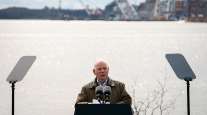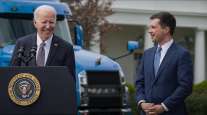Senior Reporter
Infrastructure, Climate to Be Priorities for Democrats in Congress in 2019

The White House next year intends to promote a robust infrastructure agenda and will expect Congress to produce legislation that would ensure long-term funding for roads and bridges, senior Republican policymakers in the U.S. House told Transport Topics in recent interviews.

Pelosi
These lawmakers expressed confidence in their ability to deliver such legislation for the president in 2019, but their chances would be helped if their party retains control of the chamber in the midterm election. And currently, some election analysts believe Democrats will claim the House in the elections.
Those analysts don’t believe the Senate will lose its Republican majority, but a shift in the power dynamics in the House could be enough to complicate the White House’s plans for infrastructure.
While the Trump White House unveiled a 10-year, $1.5 trillion plan in February that would depend strongly on private sector funds, Democrats have argued for a different approach, calling for caches of federal funds that would boost whatever long-term infrastructure package is ultimately crafted.

Schumer
Earlier this year, House Democrats proposed a $1 trillion infrastructure package that would aim to restore and maintain environmental protections and labor standards, upgrade the country’s 56,000 structurally deficient bridges, improve intercity passenger rail service, ensure railroads implement automatic braking systems and advance severe-weather resilient infrastructure.
House Democrats noted on their leadership website that doing so would “build world-class transportation systems that increase safety, lower costs for commuters and businesses and get goods to market quicker.”
The plan would be realized by stabilizing the Highway Trust Fund, but no specific funding source is identified in the plan.
Shortly before leaving Washington for a congressional break heading into the midterm elections, House Minority Leader Nancy Pelosi (D-Calif.) told reporters that her party wants to deliver a plan to the country that includes “bigger paychecks by building infrastructure of America.”
In March, Pelosi’s counterpart, Senate Minority Leader Chuck Schumer (D-N.Y.), and his colleagues unveiled a $1 trillion infrastructure plan that would be federally funded, primarily through rollback of key provisions in the recent GOP-led tax reform overhaul.
However, both Pelosi and Schumer have suggested that other policy matters will likely eclipse infrastructure discussions next year. They include debates on health care, gun control and immigration.
Meanwhile, top freight stakeholders, such as the U.S. Chamber of Commerce, the trucking industry and road builders are consistent in their calls for an increase in the federal fuel tax to ensure the Highway Trust Fund’s sustainability. The fund relies on dwindling revenue from the 24.4-cent-per-gallon diesel tax and 18.4-cent-per-gallon gas tax.
Republicans have not embraced an increase in fuel taxes. And, although President Donald Trump was said to have expressed support for a fuel-tax increase this year, he has not publicly endorsed it.
Besides infrastructure, policy centered on climate will also likely dominate discussions for Democrats in 2019. Schumer suggested the caucus could proceed with a package aimed at promoting severe-weather resilient infrastructure. Recent hurricanes, such as Michael that struck the Florida Panhandle, demonstrate a need to acknowledge phenomena in international weather patterns, he said.
“We have to do so much more about climate change," Schumer said. “We have an imperative to do something.”
A report unveiled this month by the United Nations Intergovernmental Panel on Climate Change issued an alarming outlook if countries do not address greenhouse gas emissions, specifically about the rate of the planet’s potential warming over the next decade.
The League of Conservation Voters Action Fund, which is dedicated to electing candidates supportive of environmental policies, is backing key Democrats for the House and Senate who have credentials on climate change. The group is opposing Republicans Sen. Ted Cruz of Texas and Gov. Rick Scott of Florida, each of whom is in a tough election contest.
Trump disputes science that attributes human behavior as the primary source for global changes in climate.
David Wasserman of the Cook Political Report indicated this month that Republicans continue to face “especially strong headwinds in states where gubernatorial races aren’t going well for them.”
He added, “Democrats remain clear favorites for the House majority, but a modest increase in GOP intent to vote may curtail how deep they can push the battlefield into red districts where Trump won by larger margins.”




